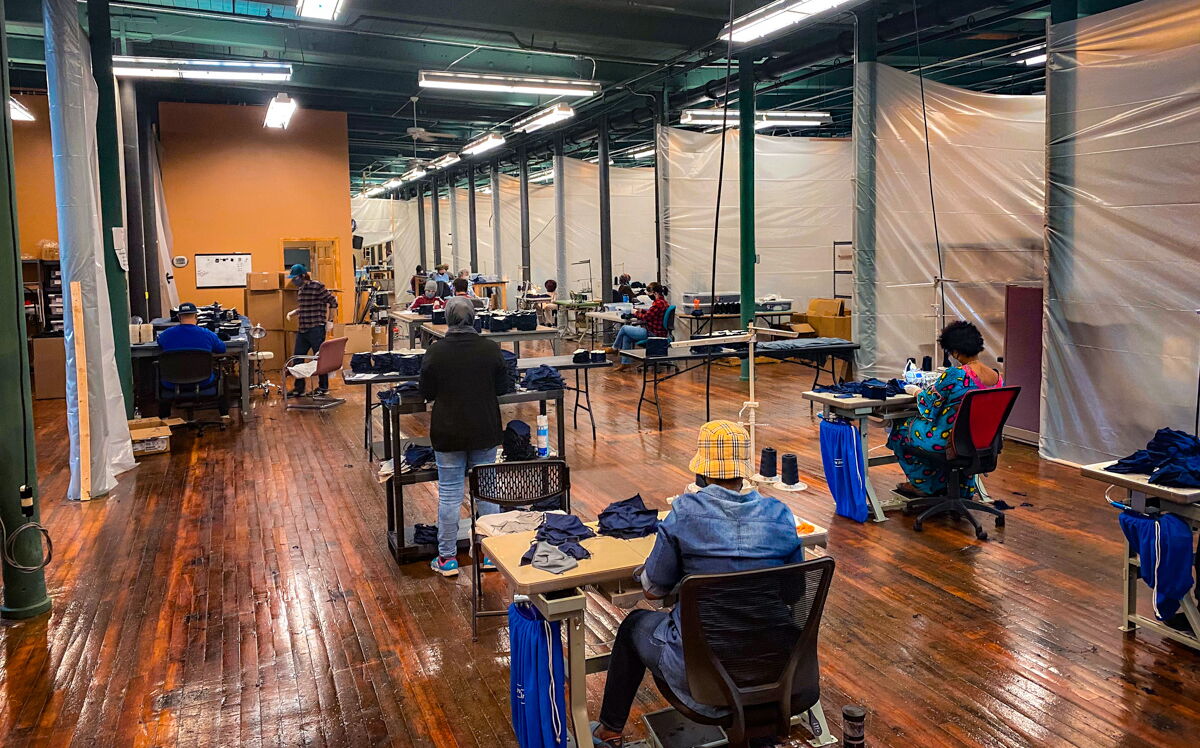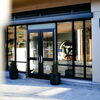
Processing Your Payment
Please do not leave this page until complete. This can take a few moments.
- News
-
Editions
View Digital Editions
Biweekly Issues
- December 1, 2025
- Nov. 17, 2025
- November 03, 2025
- October 20, 2025
- October 6, 2025
- September 22, 2025
- + More
Special Editions
- Lists
- Viewpoints
-
Our Events
Event Info
Award Honorees
- Calendar
- Biz Marketplace
Startup restarts: Mission-driven pivot sparks growth at two Maine niche textile makers
 Photos / Courtesy of American Roots
American Roots, founded by husband-wife team Ben Waxman and Whitney Reynolds in 2015, is making protective face shields and washable cloth masks at its factory inside Westbrook’s Dana Warp Mill building. They aim to be up to 110 employees by June 10.
Photos / Courtesy of American Roots
American Roots, founded by husband-wife team Ben Waxman and Whitney Reynolds in 2015, is making protective face shields and washable cloth masks at its factory inside Westbrook’s Dana Warp Mill building. They aim to be up to 110 employees by June 10.
Quick on their feet when COVID-19 broke out, niche textile manufacturers Flowfold and American Roots have reinvented themselves as makers of personal protective equipment for healthcare workers and others. That’s helped them not only keep staff on the payroll, they’re also adding jobs and growing.
Both are young companies with well-established brands: Gorham-based Flowfold as a maker of lightweight wallets, bags and other outdoor gear out of recycled sailcloth, and American Roots as a producer of 100% American-sourced, union-made apparel. Childhood friends and University of Maine classmates Charles Friedman and Devin McNeill founded Flowfold in 2010, while husband and wife Ben Waxman and Whitney Reynolds started American Roots in 2015.
As they’ve built their companies, both have made missteps they’ve learned from and speak openly about, like when Flowfold goofed on the size of Japanese wallets, or bad fabric that cost American Roots $250,000 last year in what Waxman calls a “gut-check moment.”
The COVID-19 crisis has been the ultimate gut check for both firms, which shifted gears quickly to stay afloat — and relevant.
First out of the gate was Flowfold in late March, with an email to MaineHealth asking what was needed. “We need everything” was the answer. Eight days later, Flowfold had the first 1,000 shields ready, using a design vetted by MaineHealth infectious disease specialists.
Together with manufacturing partners including American Roots, it’s now making 50,000 shields a week. Hospital clients include the Dana Farber Cancer Institute in Massachusetts, as demand grows from businesses including banks, barber shops and hardware stores.
To fulfill an order for 500,000 face shields from the Maine Center for Disease Control, it’s teamed up with L.L.Bean Inc. and expects to double its workforce a second time, to 16.

While that may seem like strange territory for a wallet maker, the company’s former chief operating officer and president of sales doesn’t think so.
“For the last nine and a half years, we’ve been preparing for this unknowingly. From Day One, we’ve always said we’d put egos to the side and listened to what our customers need and been flexible in our processes,” says James Morin, who joined the company in 2016 and and spoke to Mainebiz before announcing his departure in a LinkedIn post last week. “We were well-prepared based on our experience.”
Morin says that changing course was not only the right business decision for Flowfold, but “was the moral and ethical thing for us to do.”
“It kept our team employed and insured, and helped to keep our community safe,” he adds. “That should be the focus.”
In making the new equipment, Flowfold is using an automated cutting machine funded in part by the Maine Technology Institute, whose President Brian Whitney says, “They are a wonderful example of a success story borne out of Maine’s innovation ecosystem.”
Among the challenges in the new circumstances: Ensuring product safety in line with Maine CDC guidelines and employee safety with proper protection and physical distancing in an expanded space that includes portable office trailers.
“It’s not luxurious by any stretch of the imagination,” Morin adds. “Everyone is rallying around a cause that’s bigger than ourselves.”
‘Crazy’ growth at American Roots
American Roots had a rougher ride before its pivot, forced to close its factory inside the Dana Warp Mill for two weeks and lay off 80% of its 27 employees, most of whom are new Mainers.
They all returned when the factory reopened, joined by 10 new colleagues, to make face shields for Flowfold in a redesigned workspace enlarged for physical distancing, which is regularly monitored. Machines, door knobs and bathrooms are sprayed every couple of hours, and break times are staggered.
They are needed as output grows exponentially, not just of face shields but also cloth face coverings made from cotton jersey T-shirt material. Over the next seven months, American Roots aims to produce a million washable masks and half a million face shields, Waxman says.
That means bringing on even more employees, to get to 110 by June 10, with training help from Common Threads of Maine, a sewing school run by his mother, Dory Waxman, a floor below American Roots.
“For me the most difficult part is being a father to two young children three years and six months old and getting up to work in the middle of a global pandemic that had a hidden enemy,” Waxman says. “My wife and I had to make some really tough decisions on what to do in those early days, but our decision was to do what we could do to help. We saw an opportunity to help in the middle of a crisis, and our team — to their credit — are the ones who stepped in.”
‘Forever changed’
Both Flowfold and American Roots say they’re committed to making protective equipment as long as the need is there, but look forward to the day they can resume their regular activities.
“This isn’t a long-term play for us. The sooner we’re back to making wallets and bags the better for everyone, doing what we love — and the health care system has recovered,” says Morin. When that happens, he says the company will determine whether it will also continue making face shields.
At American Roots, Reynolds already foresees a permanent PPE division at a company she says will never be the same again.
“It’s not only American Roots,” she says. “The world is forever changed.”
Mainebiz web partners
Related Content

The Giving Guide
The Giving Guide helps nonprofits have the opportunity to showcase and differentiate their organizations so that businesses better understand how they can contribute to a nonprofit’s mission and work.
Learn More
Work for ME
Work for ME is a workforce development tool to help Maine’s employers target Maine’s emerging workforce. Work for ME highlights each industry, its impact on Maine’s economy, the jobs available to entry-level workers, the training and education needed to get a career started.
Learn More
Groundbreaking Maine
Whether you’re a developer, financer, architect, or industry enthusiast, Groundbreaking Maine is crafted to be your go-to source for valuable insights in Maine’s real estate and construction community.
Learn more-
The Giving Guide
The Giving Guide helps nonprofits have the opportunity to showcase and differentiate their organizations so that businesses better understand how they can contribute to a nonprofit’s mission and work.
-
Work for ME
Work for ME is a workforce development tool to help Maine’s employers target Maine’s emerging workforce. Work for ME highlights each industry, its impact on Maine’s economy, the jobs available to entry-level workers, the training and education needed to get a career started.
-
Groundbreaking Maine
Whether you’re a developer, financer, architect, or industry enthusiast, Groundbreaking Maine is crafted to be your go-to source for valuable insights in Maine’s real estate and construction community.
ABOUT
NEW ENGLAND BUSINESS MEDIA SITES
No articles left
Get access now
In order to use this feature, we need some information from you. You can also login or register for a free account.
By clicking submit you are agreeing to our cookie usage and Privacy Policy
Already have an account? Login
Already have an account? Login
Want to create an account? Register
Get access now
In order to use this feature, we need some information from you. You can also login or register for a free account.
By clicking submit you are agreeing to our cookie usage and Privacy Policy
Already have an account? Login
Already have an account? Login
Want to create an account? Register











0 Comments